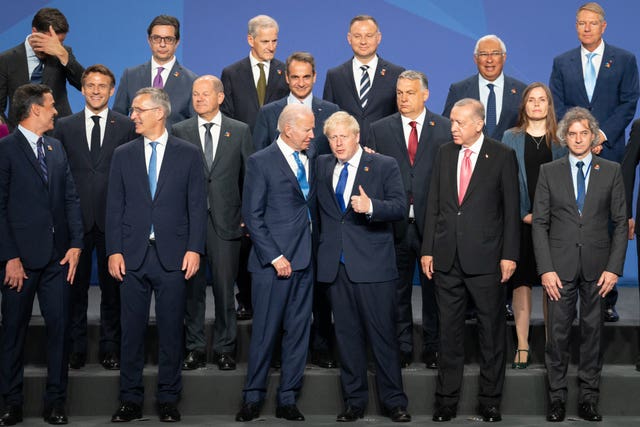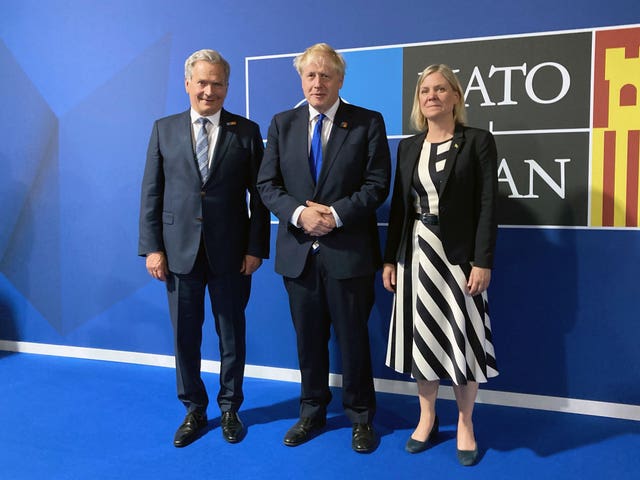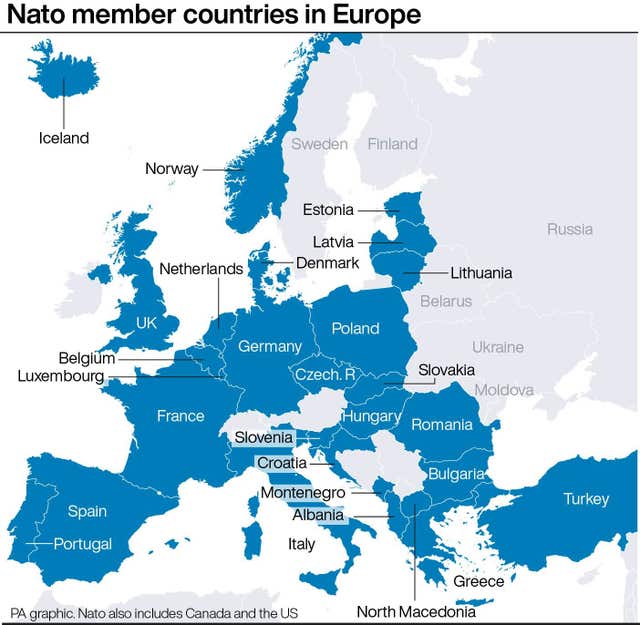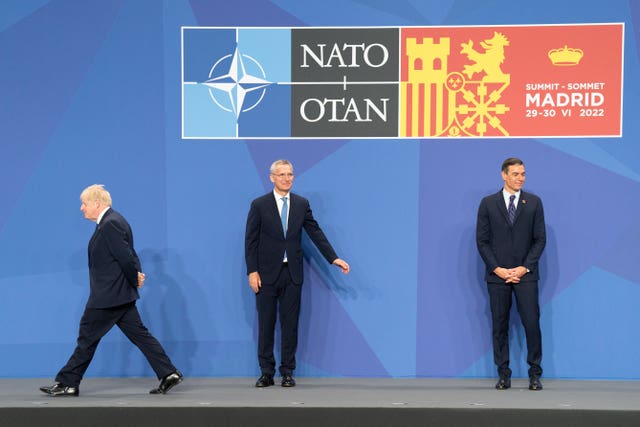Nato has agreed a “fundamental shift” which will see it return to Cold War-style readiness to respond to the increased threat posed by Russia.
Prime Minister Boris Johnson said Vladimir Putin had been proved “completely wrong” about the strength of the defence alliance, which is set to expand to include Sweden and Finland after they ended decades of neutrality over concerns about Russia.
Leaders of the 30 Nato members gathered in Madrid to agree a new plan for the alliance in response to the invasion of Ukraine.
The move will mean 300,000 troops at high readiness next year, up from the current level of 40,000.
For the UK, this will mean the “majority” of naval forces – including one of the aircraft carriers and its support vessels – being available to Nato, along with extra air squadrons and land brigade-sized units.

Nato secretary general Jens Stoltenberg said: “Today, Nato leaders decided a fundamental shift in our defence and deterrence to respond to a new security reality.”
Heavy equipment will be pre-positioned in eastern Nato members along with stockpiles of supplies, while forces from western members will be assigned specific regions on the eastern flank to protect in partnership with local troops.
“This is the first time since the Cold War that we have these kind of plans with pre-assigned forces,” Mr Stoltenberg said.
The Nato leaders were addressed by Ukraine’s Volodymyr Zelensky, who criticised them for failing to do enough to equip his forces or grant his country membership of the alliance.
Speaking via video link from Kyiv he said Ukraine’s resistance was protecting the Nato members.
He asked: “Hasn’t our contribution to defending Europe and the entire civilization been sufficient? What else is necessary?”
But Mr Stoltenberg said: “Ukraine can count on us for as long as it takes.
“Allies will continue to provide major military and financial help.”
The alliance agreed a new assistance package including communications kit, fuel, medical supplies and body armour, along with counter-mine equipment and anti-drone systems.
The new strategic concept adopted by Nato makes clear that Russia poses “the most significant and direct threat” to security.

Mr Johnson met the leaders of Sweden and Finland to congratulate them on moving a step closer to Nato membership after Turkey dropped its objections.
The Prime Minister said: “The first lesson really from today is that if Vladimir Putin was hoping he would be getting less Nato on his western front as a result of his unprovoked, illegal invasion of Ukraine, he’s been proved completely wrong, he’s getting more Nato.”
As part of the UK’s effort to reinforce Nato’s eastern flank, the British presence in Estonia will be bolstered.
In response to Russia’s invasion of Ukraine, the UK increased its presence in Estonia to include the temporary deployment of a second battlegroup, doubling the total number of deployed personnel to over 1,600.
Further troops will be allocated to the Baltic region, bringing the total to the equivalent of a brigade – although these troops will be held at readiness rather than necessarily deployed to Estonia.

The Prime Minister urged alliance leaders to increase their defence budgets but he is under pressure to do more on the UK’s military spending.
Defence Secretary Ben Wallace, who is also attending the Madrid summit, said that while he has enough funding for the “here and now”, extra investment is needed in the next Government spending round from the middle of the decade.
“My (spending) settlement was done before Russia invaded Ukraine.
“Russia is very, very dangerous on the world stage,” he told Sky News.
“The world is less secure than it was two, three years ago, and is not looking likely to change for the rest of the decade.
“That is the moment, in the middle of the decade, to say we should commit to increased funding.”
Downing Street defended the Government’s record on funding, insisting the benefits of new technology and kit outweighed cuts in the number of soldiers.
The row comes after the Chief of the General Staff, General Sir Patrick Sanders, warned any further cuts to the size of the British Army would be “perverse”.
The Prime Minister’s official spokesman said: “We are still of the view that we have set out with this massive increase in defence funding is the right one because it would be wrong, given what we are seeing play out in front of our eyes, to focus solely on numbers when we can see the impact that the latest technologies, equipment, training, intelligence are having.
“We are confident that we can do both, essentially, with this £24 billion extra that is going in to our armed forces.”

US President Joe Biden said two additional F-35 fighter jet squadrons will be sent to the UK, while a new permanent headquarters will be set up in Poland as part of his commitment to the alliance.
“Today I’m announcing the United States will enhance our force posture in Europe and respond to the changing security environment as well as strengthening our collective security,” he said.
Nato’s new strategy also acknowledges the emergence of China as an economic and military power.
The allies state that Beijing’s coercive policies “challenge our interests, security and values”.
Foreign Secretary Liz Truss used an appearance at the summit event to warn that “with China extending its influence through economic coercion and building a capable military there is a real risk that they draw the wrong idea which results in a catastrophic miscalculation such as invading Taiwan”.
She said: “That is exactly what we saw in the case of Ukraine, a strategic miscalculation by Putin, so this is why it’s so important that the free world work together to help ensure that Taiwan is able to defend itself and to stress the importance of peace and stability across the Taiwan Strait.”




Comments: Our rules
We want our comments to be a lively and valuable part of our community - a place where readers can debate and engage with the most important local issues. The ability to comment on our stories is a privilege, not a right, however, and that privilege may be withdrawn if it is abused or misused.
Please report any comments that break our rules.
Read the rules hereLast Updated:
Report this comment Cancel